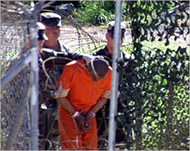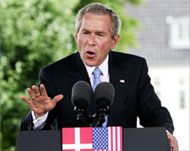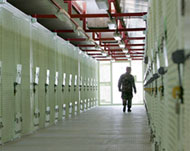Untitled Document
 |
|
The report says the US is undermining human rights worldwide
|
The United States has a deliberate strategy of abusing terror suspects
during interrogation, Human Rights Watch has said in its annual report on abuses
in more than 70 countries.
Based mostly on statements by senior administration officials in 2005, the human
rights group said the reassurances of President George Bush that the United
States does not torture suspects were deceptive and rang hollow.
"In 2005 it became disturbingly clear that the abuse of detainees had
become a deliberate, central part of the Bush administration's strategy of interrogating
terrorist suspects," the report said.
Bush's repeated assurances that US interrogators do not torture prisoners deceptively
and studiously avoid mentioning that international law prohibits cruel, inhuman
or degrading treatment of prisoners, Human Rights Watch said.
In fact, last January, Alberto Gonzales, the attorney-general, claimed in Senate
testimony the power to use cruel, inhuman or degrading treatment as long as
the prisoner was not an American and was held outside the United States, the
report said.
"Other governments obviously subject detainees to such treatment or worse,
but they do so clandestinely," the report said.
"The Bush administration is the only government in the world known to
claim this power openly, as a matter of official policy, and to pretend that
it is lawful."
The White House has flatly rejected Human Rights Watch's criticisms, saying
the group was undermining itself by pursuing "a political agenda."
"I'm rejecting the description of the United States," spokesman Scott
McClellan said, admiting that he was had not seen the actual report, only media
coverage of it.
"When a group like this makes some of these assertions, it
diminishes the effectiveness of that organization," he said. "It
appears to be based more on a political agenda than facts."
Counterproductive
 |
|
The report accuses Bush of
seeking to justify torture
|
In recent years, Human Rights Watch has emphasised its conviction that abuses
in the name of fighting terror are unjustified and counterproductive.
Kenneth Roth, executive director of the group, said he remained worried over
Bush assertion that he retained "commander in chief authority" to
order abusive interrogations.
The report said that last March CIA Director Porter Goss justified a torture
technique called water-boarding, in which the victim is made to believe that
he is about to drown.
In addition the report noted that in Senate testimony last August Timothy Flanigan,
a former deputy White House counsel, said the administration would not rule
out the use of mock executions in interrogation situations.
It went on to add that evidence shows abusive interrogation has been a conscious
policy choice by senior US government officials and cannot be reduced to the
misdeeds of a few low-ranking soldiers.
Fuelling terror
 |
|
Human Rights Watch says US
policy is fuelling terrorism
|
Roth said the tactics were fuelling terrorist recruitment,
discouraging public assistance against counterterrorists
and making prosecution of many detainees impossible.
"The hypocrisy factor has encouraged copycat techniques
around the world by people who do like the United States does," said Roth,
adding that the policies of the current administration had "weakened the
United States as one of the traditional important supporters of human rights".
The report was was also highly critical of some US allies.
It criticized Britain for trying to send terrorism suspects to countries where
they faced torture and said Canada had tried
to dilute a new treaty outlawing enforced disappearances.
'Leadership void'
It said those practices by US allies - combined with the European Union's practice
of subordinating human rights to trade in its relationships with many rights
offenders - left a "global leadership void" in defending human rights.
"Sadly, Russia and China were all too happy to fill that void by building
economic, political, and military alliances without regard to the human rights
practices of their partners." the report said.
Russia, trying to counter democratic currents in former Soviet states, and
China, seeking resources for its economy,
bolstered abusive governments, creating pressure for other
powers to do the same or risk losing influence, it said.
Among several "bright spots" on the global human rights scene, the
report said increased international pressure on Myanmar, formerly known as Burma,
and North Korea were among optimistic signs.
The group also lauded India for freezing military aid to Nepal after a royal coup there in February and credited Kyrgyzstan
for rescuing more than 400 refugees from a massacre in its Central Asian neighbor, Uzbekistan.

